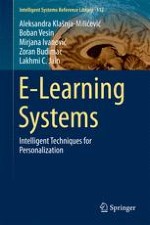2017 | OriginalPaper | Buchkapitel
3. Personalization Based on Learning Styles
verfasst von : Aleksandra Klašnja-Milićević, Boban Vesin, Mirjana Ivanović, Zoran Budimac, Lakhmi C. Jain
Erschienen in: E-Learning Systems
Aktivieren Sie unsere intelligente Suche, um passende Fachinhalte oder Patente zu finden.
Wählen Sie Textabschnitte aus um mit Künstlicher Intelligenz passenden Patente zu finden. powered by
Markieren Sie Textabschnitte, um KI-gestützt weitere passende Inhalte zu finden. powered by
